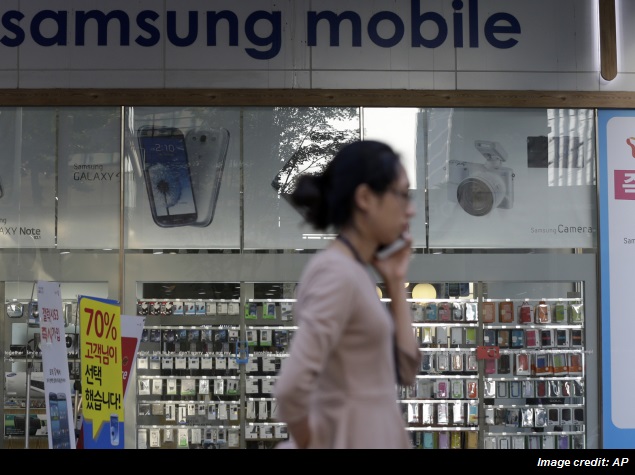- Home
- Mobiles
- Mobiles News
- Samsung Considers Its Counterattack as Rivals Erode Cellphone Profit
Samsung Considers Its Counterattack as Rivals Erode Cellphone Profit

Samsung, a South Korean company, said last week that profit in the last quarter was expected to be 25 percent lower than in the period a year earlier.
Among other factors, Samsung blamed intense competition from Chinese manufacturers for the decline. Companies like Xiaomi and Huawei have quickly increased market share in China during the last year with the help of handsets they sell at a break-even price.
Chinese companies have swooped into many other industries, including personal computers and solar energy, to produce products less expensively. This strategy has traditionally been used after a market matures, at which point the Chinese companies find a way to make and sell products nearly at cost, building market share and eating into the profit of the incumbents.
Investors and analysts are now wondering whether Samsung will choose to cut prices or push innovation harder in order to fight back.
"How does Samsung compete against players that price at cost?" said Adnaan Ahmad, an analyst for Berenberg Bank in London, in a research note. "Investors should question where the growth is."
Samsung's response to its predicament could shape the entire smartphone market.
If Samsung aggressively cuts prices to improve sales, it could pressure other competitors like Nokia, HTC and Motorola Mobility to lower prices, too. That could lead to lower-quality products or even slimmer margins for the smartphone business as a whole. Already, in many recent financial quarters, Samsung and Apple are the only companies showing a profit from smartphones.
The low-end market is not Samsung's only worry. At the high end, its main rival is Apple, which has continued to improve iPhone sales. T. Michael Walkley, a Canaccord Genuity analyst, said Apple could find even more success if the company releases phones with larger screens this year, as is widely expected.
Samsung has shown no signs that it wants to go down the price-cutting path. It declined to make an executive available for an interview, but in a written statement, the company said it would continue to compete through a diverse set of products that fulfill consumer needs.
"We also will strengthen our product competitiveness by reinforcing our premium brand reputation, powerful product lineup and cutting-edge technology," the company said.
In other words, Samsung, at least for now, plans to keep doing what it is already doing: offering a large variety of mobile products at a wide range of prices.
But it remains unclear whether that will be enough.
Ben Bajarin, a consumer technology analyst for Creative Strategies, said the competitive dynamic among devices running Google's Android system, like most of Samsung's offerings and the inexpensive handsets made by Chinese manufacturers, was starting to shift.
Because all Android smartphones work similarly, he said, hardware does not make a device stand out. Software and Internet services, like video streaming or messaging, will set the devices apart.
Xiaomi, the rising Chinese electronics brand, is a chief example of that. The company makes several models of Android smartphones, including handsets that have many of the same features as top phones from Apple and Samsung, but cost less than half the price.
But the hardware and low price are just a small part of what gives Xiaomi its advantage. To lure customers and keep them loyal, the company offers a special version of Android, called Miui. Fans can help design Miui by giving feedback online, and the company releases a new version of the operating system every Friday to keep fans excited.
Xiaomi's business model is unique among Android phone vendors. It sells phone models for about the same amount it costs to buy and assemble the materials. But it sells the phones for up to a year and a half, giving time for the components' price to fall. Xiaomi also makes money from selling apps, games, special Android themes and Internet services.
Making money off Internet services will be Xiaomi's core business strategy, the company has said.
"Cellphones are really just like PCs were 20 years ago," Lin Bin, one of Xiaomi's founders, said at a business conference last year. "They generated big profit margins in the beginning. But those margins are in the single digits now. The same thing is beginning to happen to smartphones. So rather than focus on devices where margins will decline, we're focusing on services."
But Samsung's smartphone business is still reliant on selling hardware. While the company also offers specially customized versions of the Android system for its smartphones and tablets, its software has been widely panned by reviewers and customers. And in Internet services like maps and online messaging, Samsung is virtually irrelevant.
Samsung has been working with Intel and other companies on a new mobile operating system called Tizen. But Ahmad of Berenberg predicted Tizen would fail as other competing software systems have before, like Palm's WebOS and BlackBerry's latest software system, BlackBerry 10.
In the end, he said, the company will probably resort to cutting its prices, sacrificing profit margins even more.
"Samsung has had a knack historically of playing the price game if its market share is under any pressure," Ahmad said. "Why should history not repeat itself for its high-end portfolio?"
Apple, too, makes most of its profit from selling hardware, but it does not share Samsung's problems, Bajarin said. To stand out and keep customers loyal, Apple offers operating systems and Internet services that run only on Apple hardware.
A Samsung customer, by contrast, can always switch to an Android phone made by another company, log in to Google services and have basically the same phone. And if you can buy some other Android phone more cheaply than a Samsung device, why not?
"That's really the difficult part for them," Bajarin said. "Their customers are actually Google's, they're not necessarily theirs."
© 2014 New York Times News Service
Get your daily dose of tech news, reviews, and insights, in under 80 characters on Gadgets 360 Turbo. Connect with fellow tech lovers on our Forum. Follow us on X, Facebook, WhatsApp, Threads and Google News for instant updates. Catch all the action on our YouTube channel.
Related Stories
- Samsung Galaxy Unpacked 2025
- ChatGPT
- Redmi Note 14 Pro+
- iPhone 16
- Apple Vision Pro
- Oneplus 12
- OnePlus Nord CE 3 Lite 5G
- iPhone 13
- Xiaomi 14 Pro
- Oppo Find N3
- Tecno Spark Go (2023)
- Realme V30
- Best Phones Under 25000
- Samsung Galaxy S24 Series
- Cryptocurrency
- iQoo 12
- Samsung Galaxy S24 Ultra
- Giottus
- Samsung Galaxy Z Flip 5
- Apple 'Scary Fast'
- Housefull 5
- GoPro Hero 12 Black Review
- Invincible Season 2
- JioGlass
- HD Ready TV
- Laptop Under 50000
- Smartwatch Under 10000
- Latest Mobile Phones
- Compare Phones
- Realme Neo 8
- OPPO Reno 15 FS
- Red Magic 11 Air
- Honor Magic 8 RSR Porsche Design
- Honor Magic 8 Pro Air
- Infinix Note Edge
- Lava Blaze Duo 3
- Tecno Spark Go 3
- HP HyperX Omen 15
- Acer Chromebook 311 (2026)
- Lenovo Idea Tab Plus
- Realme Pad 3
- HMD Watch P1
- HMD Watch X1
- Haier H5E Series
- Acerpure Nitro Z Series 100-inch QLED TV
- Asus ROG Ally
- Nintendo Switch Lite
- Haier 1.6 Ton 5 Star Inverter Split AC (HSU19G-MZAID5BN-INV)
- Haier 1.6 Ton 5 Star Inverter Split AC (HSU19G-MZAIM5BN-INV)

















